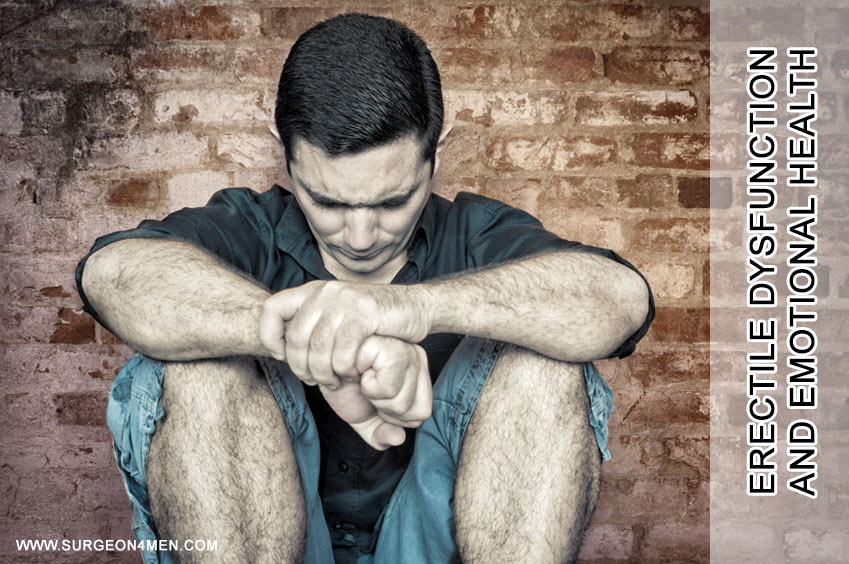Erectile Dysfunction and Emotional Health
Erectile dysfunction is a fairly common cause of male visits to the sexual clinics. Based on the latest estimates, approximately 18 million men are currently living with erectile dysfunction in United States alone (1). It has been estimated that approximately one-fourth (or 25%) of all the cases of erectile dysfunction are due to psychological or emotional elements.
It is imperative to understand that emotional health has a dual relationship with your sex life. For example, inadequate emotional health (such as uncontrolled or chronic anxiety, stress, depression etc.) can influence your performance in the bedroom and may aggravate erectile dysfunction. Likewise, sexual dysfunction is itself a leading cause of depression anxiety, agitation and mood disorders in affected males that can also deteriorate the quality of sexual relationships. In either case, it is very important to identify and manage the cause-effect relationship for optimal resolution of erectile complaints.
But the question is how emotional health can influence the penile erection and sexual physiology?
Emotional Health Issues Leading to Erectile Dysfunction
It is imperative to understand that negative thoughts and emotions has a direct effect on your performance, your interests and your capacity to get intimate with your sexual partner. Similarly, undue stress or phobias can also interfere with your intimate life since adequate erection is impossible to achieve without optimal synchronization of mind and body.
The following factors can lead to psychological distress and may interferes with the erection:
- Feelings of self-reproach
- Low self-regard or body-image of self
- Uncertainty and concerns about your sexual strength, capacity or preferences
- Feeling of non-fulfilment of your partner’s hopes
- Aiming higher prospects for yourself
- Extra affairs like financial issues, extra-marital affairs or marital discord
- Pressure about your sexual drive, vigor or even irrelevant issues
- Lack of frankness with your partner
Consequently, the body is not in harmony with mind, which decreases the desire and drive to be intimate with the partner. In addition, a hectic, overburdened lifestyle in the setting of ongoing psychological ailments such as depression and emotional instability can also affect libido and may even lead to erectile dysfunction.
Erectile Dysfunction Leading to Emotional Health Issues
Erectile dysfunction and psychological effects can be best related to a vicious cycle. Males who develop erectile dysfunction due to other factors such as diabetic neuropathy, hypertensive crisis, advancing age, thyroid dysfunction or injuries often tend to seek solace drinking and smoking that further worsens the sexual functions. It has been reported that inadequate erection or sexual performance always exacerbates the depression and stress.
According to a new study reported in the Journal of Sexual Medicine (2), investigators suggested that sexual dysfunction (such as erectile issues, premature ejaculation etc.) can lead to psychological as well as physical ailments. The study provided statistical evidence that males who develop erectile dysfunction are at much higher risk of developing depression, stress disorders, diabetes and cardiovascular disorders.
Getting Help for Erectile Dysfunction
- Discuss your concerns and issues with you a registered healthcare professional to ascertain the cause of erectile dysfunction.
- It is important to make a list of all the possible causes (medical as well as psychological) that may have contributed to the ED. This also includes any recent change of environment (such as switching a job/ career, relocating to a new place) or life situation as a whole (such as marriage, divorce, extra-marital affair etc.). For example, according to the study reported by Štulhofer (3) and associates, strain or issues at job are one the leading causes of sexual difficulties and erectile issues in males. The study was conducted in three different population and results were surprisingly similar, suggesting that emotional support and work-place counseling can improve sexual function in males.
- Therapy: There are a number of therapeutic interventions that can be used to address or manage the psychological symptoms and/or erectile issues. For example, for mild occasional erectile dysfunction, phosphodiesterase inhibitors (such as Viagra or Sildenafil) can be used. For more serious cases, prosthetic implants, penile injection or assistive devices can be employed.
- Handling stress and disappointment: Stress can be managed by simple remedies. For example, adopt meditation, yoga, regular physical activity or other methods of self-care to improve overall health.
It is very important to understand the dual relationship of emotional health and erectile dysfunction. Ignoring either of the two can lead to more serious issues. In short, the emotional well-being and adequate synchronization between you and your partner can define the outcome of your moments of seclusion and intimacy. Your physical strength and performance are not the only components that determines the quality of sex life.
References:
- Selvin, E., Burnett, A. L., & Platz, E. A. (2007). Prevalence and risk factors for erectile dysfunction in the US. The American journal of medicine, 120(2), 151-157.
- Tan, H. M., Tong, S. F., & Ho, C. C. (2012). Men’s health: sexual dysfunction, physical, and psychological health—is there a link?. The journal of sexual medicine, 9(3), 663-671.
- Štulhofer, A., Træen, B., & Carvalheira, A. (2013). Job‐Related Strain and Sexual Health Difficulties among Heterosexual Men from Three European Countries: The Role of Culture and Emotional Support. The journal of sexual medicine, 10(3), 747-756.
- Messaoudi, R., Menard, J., Ripert, T., Parquet, H., & Staerman, F. (2011). Erectile dysfunction and sexual health after radical prostatectomy: impact of sexual motivation. International journal of impotence research, 23(2), 81-86.
